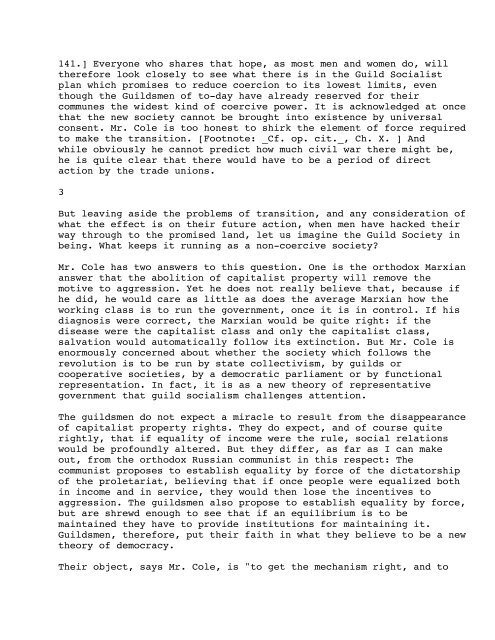PUBLIC OPINION by WALTER LIPPMANN TO FAYE LIPPMANN ...
PUBLIC OPINION by WALTER LIPPMANN TO FAYE LIPPMANN ...
PUBLIC OPINION by WALTER LIPPMANN TO FAYE LIPPMANN ...
Create successful ePaper yourself
Turn your PDF publications into a flip-book with our unique Google optimized e-Paper software.
141.] Everyone who shares that hope, as most men and women do, will<br />
therefore look closely to see what there is in the Guild Socialist<br />
plan which promises to reduce coercion to its lowest limits, even<br />
though the Guildsmen of to-day have already reserved for their<br />
communes the widest kind of coercive power. It is acknowledged at once<br />
that the new society cannot be brought into existence <strong>by</strong> universal<br />
consent. Mr. Cole is too honest to shirk the element of force required<br />
to make the transition. [Footnote: _Cf. op. cit._, Ch. X. ] And<br />
while obviously he cannot predict how much civil war there might be,<br />
he is quite clear that there would have to be a period of direct<br />
action <strong>by</strong> the trade unions.<br />
3<br />
But leaving aside the problems of transition, and any consideration of<br />
what the effect is on their future action, when men have hacked their<br />
way through to the promised land, let us imagine the Guild Society in<br />
being. What keeps it running as a non-coercive society?<br />
Mr. Cole has two answers to this question. One is the orthodox Marxian<br />
answer that the abolition of capitalist property will remove the<br />
motive to aggression. Yet he does not really believe that, because if<br />
he did, he would care as little as does the average Marxian how the<br />
working class is to run the government, once it is in control. If his<br />
diagnosis were correct, the Marxian would be quite right: if the<br />
disease were the capitalist class and only the capitalist class,<br />
salvation would automatically follow its extinction. But Mr. Cole is<br />
enormously concerned about whether the society which follows the<br />
revolution is to be run <strong>by</strong> state collectivism, <strong>by</strong> guilds or<br />
cooperative societies, <strong>by</strong> a democratic parliament or <strong>by</strong> functional<br />
representation. In fact, it is as a new theory of representative<br />
government that guild socialism challenges attention.<br />
The guildsmen do not expect a miracle to result from the disappearance<br />
of capitalist property rights. They do expect, and of course quite<br />
rightly, that if equality of income were the rule, social relations<br />
would be profoundly altered. But they differ, as far as I can make<br />
out, from the orthodox Russian communist in this respect: The<br />
communist proposes to establish equality <strong>by</strong> force of the dictatorship<br />
of the proletariat, believing that if once people were equalized both<br />
in income and in service, they would then lose the incentives to<br />
aggression. The guildsmen also propose to establish equality <strong>by</strong> force,<br />
but are shrewd enough to see that if an equilibrium is to be<br />
maintained they have to provide institutions for maintaining it.<br />
Guildsmen, therefore, put their faith in what they believe to be a new<br />
theory of democracy.<br />
Their object, says Mr. Cole, is "to get the mechanism right, and to





